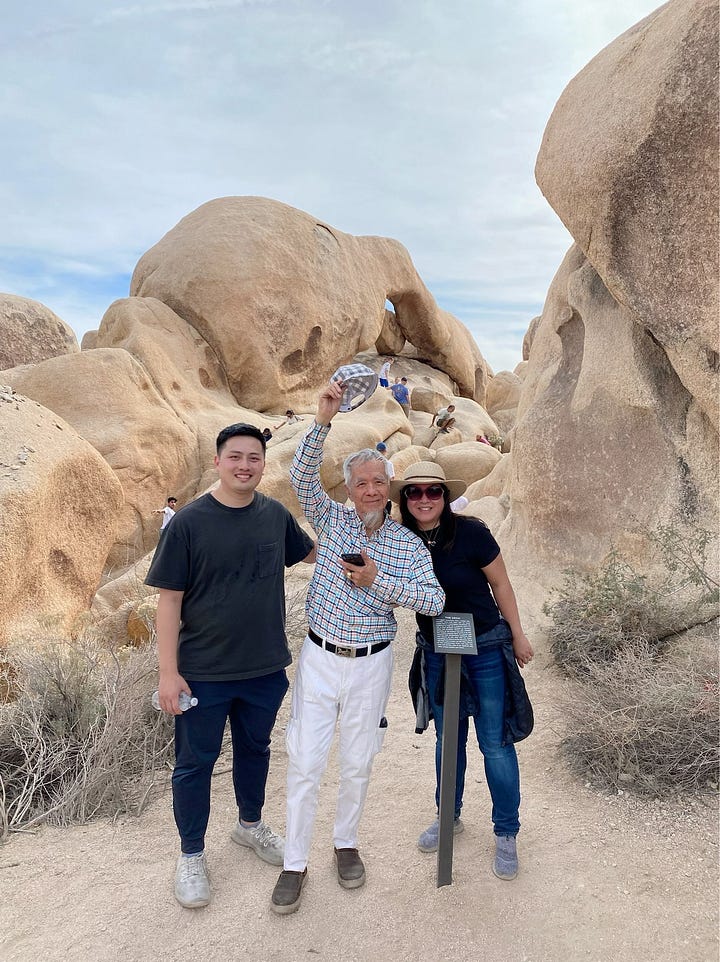Your best self is your real self (Ricky Weekly #85)
This is where I share 3 things every week with my friends and anyone else interested.
—
A picture from my life:


Happy new year! I took trips with my family to Joshua Tree and with my girlfriend to Tahoe in December. I feel lucky to be able to go to these places.
A thing on my mind:
Trigger warning: I wrote evasively but the topic is fraught with feelings.
Last time I wrote about how “loneliness is a symptom [of] declining to share a piece of [yourself] with people…” The flip side is captured by author Jennifer Senior in an article called It’s Your Friends Who Break Your Heart:
“Philip made me feel that my best self was my real self,” he finally said. “I think that’s what happens when friendships succeed. The person is giving back to you the feelings you wish you could give to yourself. And seeing the person you wish to be in the world.”
That might be a lot to ask of friends, but as Senior explains in the article, friendship’s voluntary nature makes it the rare form of relationship that can deliver “unconditional positive regard.” Family, on the other hand, can be complicated.
When I hear someone say they want to discuss a problem in their life with their parents, I’m usually shocked. I can’t fathom the idea that a parent can play the role of counsel after you’re independent. When I think about my relationship with my own parents, I’ve long casted myself into roles that help me keep the interactions pleasant. I can help provide, solve problems, entertain, but otherwise I act like everything on my end is always fine and handled. Obviously I’d love to share my issues with them, but at best they feel helpless. At worst, at least in my case with a narcissist* in the mix, my issues get brushed aside and it becomes about them again, triggering more childhood trauma. Most people know immigrant children have to grow up quickly to help their parents navigate life in an unfamiliar country, but I wonder if anyone knows the extent immigrant children are likely to be victims of abuse. Uprooting your life to move to a foreign land, usually as an act of desperation, often come with trauma. The children end up bearing the brunt of it.
Over the holidays I had to advise two different people to consider keeping a “healthy” emotional distance from their family like I’ve done with mine. Their family member has caused them too much grief for too long, and expecting the member to come around is the source of the grief. It feels cold-blooded and hurts quite a bit to not have expectations in order to be content, but the alternative is too painful. At least for me, the way to remove expectations is to get to know the person beyond their role in the family and their relationship with you. The more you know the person, the more you understand why they can’t give you what you want, and the easier it’d be to relieve them and yourself from that expectation.
*Not a big redditer but I recently discovered r/raisedbynarcissists and it resonates quite a bit.
A piece of content I recommend:
It’s Your Friends Who Break Your Heart by Jennifer Senior for The Atlantic
It’s a long read but totally worth it. Here’s an excerpt:
According to Laura Carstensen, the director of the Stanford Center on Longevity, I’ve aged out of the friendship-collecting business, which tends to peak in the tumbleweed stage of life, when you’re still young enough to spend Saturday evenings with random strangers and Sunday mornings nursing hangovers at brunch. Instead, I should be in the friendship-enjoying business, luxuriating in the relationships that survived as I put down roots.
And I am luxuriating in them. But those friendships are awfully hard-won. With midlife comes a number of significant upheavals and changes, ones that prove too much for many friendships to withstand. By middle age, some of the dearest people in your life have gently faded away.
You lose friends to marriage, to parenthood, to politics—even when you share the same politics. (Political obsessions are a big, underdiscussed friendship-ender in my view, and they seem to only deepen with age.) You lose friends to success, to failure, to flukish strokes of good or ill luck. (Envy, dear God—it’s the mother of all unspeakables in a friendship, the lulu of all shames.) These life changes and upheavals don’t just consume your friends’ time and attention. They often reveal unseemly characterological truths about the people you love most, behaviors and traits you previously hadn’t imagined possible.
Bonus content: Jocko Podcast 221: Jonny Kim. Navy SEAL, Doctor, Astronaut. The Unimaginable Path
Thinking about abuse reminded me of this four-hour interview Jonny Kim did with Jocko Willink. To get a sense of the family conditions that forged a person who became a Navy SEAL, a doctor and an astronaut, listen to the segment starting at 24:50.
—
As always, you can find out what I’m thinking in more real-time on Twitter and my essays are on my website. My primary focus (and where I focus) is on Flow Club.



